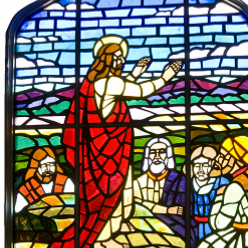The E source story of Aaron’s golden calves (in Exodus) can be best understood as being crafted as a response to the decision of King Jeroboam to create and set up for the people of the northern tribes an alternative centre of worship in his own kingdom. After creating these “golden calves,” he declared to the people:
Here are your gods, O Israel, who brought you up out of Egypt.
One is immediately struck by the identity in the E source wording used when Aaron is reported to have revealed the golden calf to the people:
Here are your gods, O Israel, who brought you up out of Egypt.
Who can explain why no-one is reported to have brought to Jeroboam attention the parallel to be found in Aaron’s statement? – saying, “You are doing exactly the thing for which Aaron was condemned and three thousand people lost their lives!”
Genre
They did not do that because the Aaronic episode found in Exodus never happened. Instead, we can conclude that the story of Aaron’s sin was intended to be a parody of Jeroboam’s action. It is question of genre, and is something that the listeners would have understood. Dramatic expressions of this kind were already known in Israel. A similar “parable” had been used by the prophet Nathan to rebuke King David, when Nathan told King David a story about the rich man who stole a sheep from the poor man. David believed that Nathan was talking about a real rich man and a real poor man, even though Nathan’s story was not “historical” it was Nathan’s way of exposing David’s sin in killing Uriah the Hittite in order to take Bathsheba as his own wife.
Aaron’s innocence
One aspect of this story can initially be considered to be “difficult” is the attribution to Aaron of the sin of setting up the golden calves, especially since the writer appears to be very favourable to the Levites as a group. Why did he treat Aaron as a pariah? The answer is easy to find.
Let us put ourselves in the place of Jeroboam and his advisors. Faced with criticism of the legitimacy of his decision, he is likely to have claimed that he was just following the example of Jonathan, the Levite from Bethlehem, (and therefore) a descendant of Aaron. This Levite had already endorsed the use of a silver statue in the worship of Yahweh, and a result had been honoured by the people of Dan, so much so that he became the priest for the entire tribe.
History – a base for prophecy
This story is a good example of the fact that the account of Israel’s rescue from Egypt was at very least a well-known foundation story of the Israelite people, being a story that could be exploited for prophetic purposes, dealing with present issues, and seeking to transform the people’s behaviour. Yet the account of Israel’s rescue was more than a foundation myth, it was founded in the real events of the lives of Abraham, Isaac, Jacob, Joseph, and of that of Moses and Aaron and the exodus experience.
